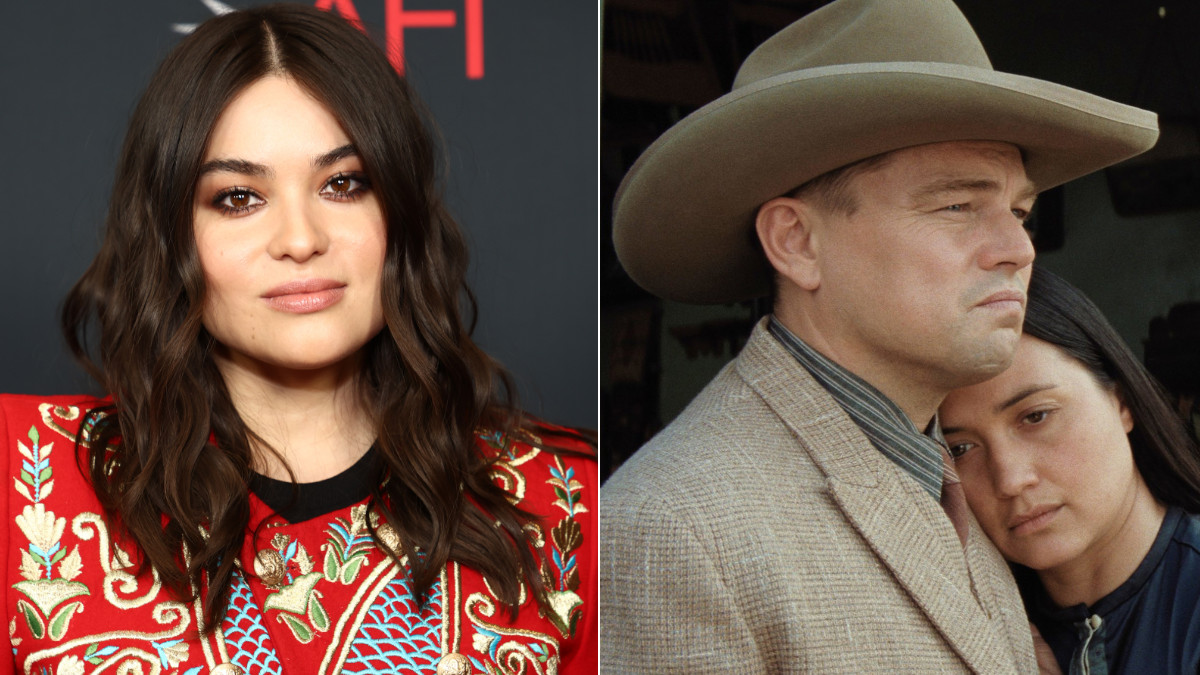‘Reservation Dogs’ Star Devery Jacobs Goes off on ‘Killers of the Flower Moon’

Reservation Dogs star Devery Jacobs has strong feelings about Killers of the Flower Moon. The Indigenous Canadian actresses slammed the film on social media for being “painful” with its “unnecessarily graphic” depiction of the Osage murders.
Killers of the Flower Moon comes from influential filmmaker Martin Scorsese and tells the horrific true story of the Osage Reign of Terror, a period in the early 1900s in which several white men conspired to murder the Osage in an attempt to gain access to their headrights. After years of displacement and suffering at the hands of settlers and the United States government, the Osage people discovered oil on their land in Pawkusha, Oklahoma, and became wealthy off of the royalties, or headrights, they received from oil companies. Unfortunately, their wealth triggered the envy, racism, and greed of white men, who would kill 60 Osage people before the FBI finally got involved.
For decades, the story was virtually erased from history until journalist David Grann investigated the story in his nonfiction book, Killers of the Flower Moon, on which Scorsese’s movie is based. While it was commendable that Scorsese sought to further bring this story to light, there was caution and skepticism over whether he would do so authentically. Fortunately, Scorsese worked closely with the Osage Nation on the film, with dozens of Osage filling acting and crew roles and serving as consultants.
The Osage Nation has had some positive responses to the film, as it is very important for them to have their story and history told, especially since, even today, some still fear retaliation for telling the story. However, some responses from the Osage have been understandably mixed and complicated, especially regarding the film’s focus on Ernest Burkhart’s (Leonardo DiCaprio) perspective and the sensitive subject matter it depicts. Now, Jacobs is digging deeper into the topic of Killers of the Flowers Moon‘s sensitivity and representation.
Devery Jacobs breaks down Killers of the Flower Moon‘s flaws
Jacobs took to X, formerly Twitter, to share her thoughts on Killers of the Flower Moon in a thread. She started by explaining how difficult it was to sit through an hours-long film of the worst crimes committed against her ancestors depicted in graphic detail. However, her criticism of the film goes a lot deeper than the violence. She pinpointed a concern that other Osage have expressed about the film’s perspective. Not only is it told from Burkhart’s point of view, but Jacobs argued that all of the white characters were developed far more than Osage characters, with the exception of Lily Gladstone’s Mollie.
Meanwhile, she acknowledged that some violence was unavoidable to illustrate the reality of this tale and the horrors that white men inflicted on this community. However, she didn’t believe the film depicted these victims with honor or dignity. Jacobs questioned why there couldn’t be a movie just celebrating Indigenous culture and their history and expressed fear that graphic films would normalize violence against Indigenous people. She was also careful to validate the feelings of the Indigenous people who responded positively to Killers of the Flower Moon, as it’s understandable that it would be “cathartic” for them to have this long-forgotten story told. That doesn’t change the fact, though, that she felt the history should’ve been told by an Osage filmmaker and that Killers of the Flower Moon might not be the type of representation that Indigenous people really needed.
Jacobs raises several excellent points in her discussion, and her perspective is one of the most important to consider in discussions of Killers of the Flower Moon. Film critics’ discussions are interesting, but what’s really important is what the film means to those whose history is being told. Jacobs emphasizes that this is a film about real people, and it can’t be denied that there may be some insensitivity in those who are overly concerned about the film’s Oscar potential and filmmaking elements. Meanwhile, it’s not hard to see why the perspective would be problematic. Some viewers may have even walked away from the film erroneously labeling it a “love story” due to its heavy focus on Ernest and what could be perceived as the film humanizing him.
What Jacobs’ discussion really pinpoints is the fact that Indigenous people should tell Indigenous stories. Killers of the Flower Moon may be as good as one can expect from a non-Indigenous filmmaker, but Indigenous people deserve much more than that. They deserve truly representative tales that tell their stories how they want them told. Additionally, these people are much more than what happened to them, and it’s time that people learned about them apart from their grief and tragedy. While it’s fortunate that the Osage history is being told, even its dark parts, Indigenous people need more power and representation in Hollywood to allow them to choose what stories get told and how they’re told.
(featured image: Emma McIntyre / Getty / Apple TV+)
Have a tip we should know? tips@themarysue.com